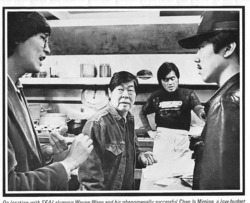Patti Smith
Wayne Wang | |||
|---|---|---|---|
 Wang in 1983 | |||
| Born | January 12, 1949 | ||
| Alma mater | California College of the Arts | ||
| Occupations |
| ||
| Years active | 1975–present | ||
| Spouse | Cora Miao | ||
| Chinese name | |||
| Traditional Chinese | 王穎 | ||
| Simplified Chinese | 王颖 | ||
| |||




Wayne Wang (traditional Chinese: 王穎; simplified Chinese: 王颖; pinyin: Wáng Yǐng; Jyutping: Wong4 Wing6; born January 12, 1949) is a Hong Kong-American film director, producer, and screenwriter. Considered a pioneer of Asian-American cinema, he was one of the first Chinese-American filmmakers to gain a major foothold in Hollywood. His films, often independently produced, deal with issues of contemporary Asian-American culture and domestic life.
His best known works include Dim Sum: A Little Bit of Heart (1985), Eat a Bowl of Tea (1989), the Amy Tan literary adaptation The Joy Luck Club (1993), Chinese Box (1997), and A Thousand Years of Good Prayers (2007). Other films include the Harvey Keitel and William Hurt–starring comedy Smoke (1995), the family film Because of Winn-Dixie (2005), the romantic comedies Maid in Manhattan (2002) and Last Holiday (2006), and the controversial erotic drama The Center of the World (2001).
He is the recipient of numerous accolades, including a Bodil Award, a Silver Bear, two Golden Shells, with BAFTA Award, Sundance Grand Jury, Golden Lion, and César Award nominations.
Biography
Wang was born and raised in Hong Kong, and named after his father's favorite movie star, John Wayne.[1] When he was 17, his parents arranged for him to move to the United States to study, to prepare for medical school. Wang, however, soon put this plan aside when his "eyes were completely opened" by new experience. He turned to the arts,[1] studying film and television at California College of Arts and Crafts in Oakland.[2]
After graduating from film school, Wang returned to Hong Kong and briefly worked on a popular soap opera before being fired and returning to the United States.[2] Here he taught English to new immigrants in Chinatown.[3]
Wang has also worked within the mainstream Hollywood studio system on the films The Joy Luck Club (1993), Maid in Manhattan (2002). Despite these being his some of his most financially successful films,[4] Wang has described the experience as largely negative, and after the production of Last Holiday (2006 film) resolved to work exclusively on independent productions.[5] Wang has also collaborated with the author Paul Auster on the films Smoke (1995) and Anywhere but Here (1999),[5] which deviated from his typical subject matter of Asian American life.
In 2001 Wang released his film The Center of the World without a MPAA rating because he refused to make cuts to the films sexually explicit scenes.[6] Wang has said the films commercial and critical failure set his career back and led him to work on less personal films[7]
He won the Golden Shell at the San Sebastian Film Festival in September 2007 for A Thousand Years of Good Prayers.
In 2016, he won a Lifetime Achievement Award at the San Diego Asian Film Festival.[8]
Personal life
He is married to actress Cora Miao, a former Miss Hong Kong. They live in San Francisco and New York City.[9]
Filmography
References
- ^ a b Lim, Dennis. "Wayne Wang, Bridging Generations and Hemispheres." New York Times. 12 September 2008.
- ^ a b Mitchell, Elvis; Ed. Lia Chang (2000). "Fade to Black With Auteur Wayne Wang". AsianWeek (10 Aug – 16 Aug). ISSN 0195-2056. Archived from the original on 2007-12-14. Retrieved 2025-03-17.
Born and raised in Hong Kong, Wayne Wang came to the United States at the age of 17 to study painting, filmmaking and TV production at California College of Arts and Crafts in Oakland, Calif.
- ^ Wayne Wang and Hua Hsu (Video). Criterion Collection. January 2022.
- ^ "Wayne Wang - Box Office". The Numbers. Retrieved 2025-05-05.
- ^ a b Hsu, Hua (2022-06-05). "How Wayne Wang Faces Failure". The New Yorker. ISSN 0028-792X. Retrieved 2025-05-05.
- ^ Indiewire (2001-03-15). "DAILY NEWS : New Wang Film Unrated; Microcinema Continues; and Chediak Chats". IndieWire. Retrieved 2025-05-10.
- ^ Yu, Brandon (2022-05-05). "Wayne Wang Still Isn't Satisfied". The New York Times. ISSN 0362-4331. Retrieved 2025-05-10.
- ^ "SDAFF Award Winners | Pacific Arts Movement". pacarts.org. Archived from the original on 2018-04-19. Retrieved 2018-04-27.
- ^ Hsu, Hua (2022-06-05). "How Wayne Wang Faces Failure". The New Yorker. ISSN 0028-792X. Archived from the original on January 17, 2024. Retrieved 2024-03-08.
- ^ "Chinatown Film Project | Museum of Chinese in America (MOCA)". www.mocanyc.org. Archived from the original on 2017-07-02. Retrieved 2019-11-10.
- ^ G. Allen Johnson (October 1, 2014). "'Soul of a Banquet': Wayne Wang's documentary on Cecilia Chiang". San Francisco Chronicle. Retrieved May 20, 2017.

 Read
Read
 AUTHORPÆDIA is hosted by Authorpædia Foundation, Inc. a U.S. non-profit organization.
AUTHORPÆDIA is hosted by Authorpædia Foundation, Inc. a U.S. non-profit organization.